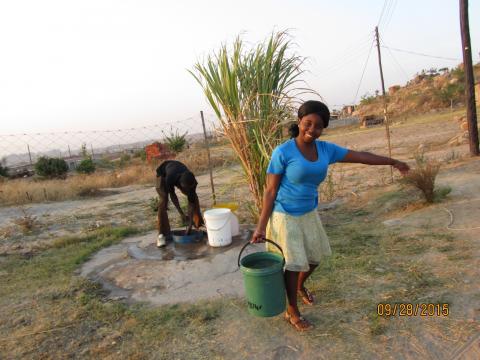
Recently, Maryknoll Office for Global Concerns staff member Sr. Claris Zwareva visited her homeland of Zimbabwe. Sr. Claris serves as Maryknoll’s representative at the United Nations where the Maryknoll Sisters and the Maryknoll Fathers & Brothers have consultative status with the Economic and Social Council (ECOSOC). Following are some observations from her trip, which were published in the November-December 2015 NewsNotes.
In September, UN member states, including Zimbabwe, unanimously approved the post-2015 Sustainable Development Goals (SDGs), a set of 17 objectives which include ending poverty and protecting the environment, to be achieved by 2030. During my visit to Zimbabwe I met people who are in dire need of relief from poverty and from the effects of climate change. They are struggling to survive economically in a country deeply affected by drought. Climate change has made life even more difficult in a country that was once the bread basket of Africa and is now dependent upon foreign imports as well as foreign currency for its commerce.
The government of Zimbabwe adopted the U.S. dollar as its currency in 2009. During my recent trip, I visited Longcheng Plaza, a shopping mall built by a Chinese corporation in 2013 on the outskirts of Harare. The shops are stocked with Chinese products that are affordable to most people. When I expressed surprise at seeing the large amount of inexpensive items, a local resident replied, “Goods from China have made it possible for the poor to have shoes on their feet.” However, the goods are of such inferior quality that they wear out quickly.
Cell phones are also easily accessible and abundant. Most Zimbabweans, both young and old, have cell phones and the demand for telephone landlines has dried up. Cell phone lines can cost as little as one dollar; the only things to do are buy a handset and then prepay for the service. I found this system helpful because I was able to purchase a cellphone and communicate with friends and relatives easily.
Although most people are happy with these developments, many young people are anxious about finding jobs and building a secure future. Despite Zimbabwe’s well-developed education system, most university graduates cannot find jobs. Because of high unemployment people are now embarking upon self-employment. I was surprised to see the number of people selling clothes and other items on the sidewalk, competing with shops offering similar goods at a lower price.
High unemployment and insufficient rainfall have exposed people to a greater degree of food insecurity. During a visit to a rural area, I saw young people purchasing maize directly from an older woman because small farmers can no longer send their crops to the Grain Marketing Board (GMB). Farmers are no longer paid quickly by the GMB, therefore they have turned to the informal market.
The drought situation has affected agricultural production as well as the availability of water for domestic consumption and for livestock, forcing people to dig wells and to sink boreholes. With the long dry season it is uncertain how long these underground water reserves will last. Water from the Kariba Dam is used to generate electricity that serves cities but this year power cuts have been very frequent due to the dam’s low water levels.
Serious shortages of water and electricity have put the humor and the resilience of the people of Zimbabwe to the test. When I experienced my first electrical blackout, my nephew said, “Welcome to Zimbabwe!” The Zimbabwe Electricity Supply Company (ZESA) is forced to ration electricity by “load shedding” – turning off electricity in one area for a few hours while turning it on in another. Often electricity will come on and go off throughout the night. Cell phones and other electrical gadgets may not recharge because of the sporadic electricity.
People are innovative in their efforts to access electricity and water. Most people have some form of solar chargers, in large and small sizes. The presence of blue water tanks on roof tops, buckets filled with water standing ready in kitchens and bathrooms, candles, flashlights, and cell phones speak to the situation of uncertainty that the people of Zimbabwe are facing today.
It is evident that in order to have sufficient water and electricity, every person in Zimbabwe must do his or her part. Unhealthy environmental practices that increase atmospheric temperatures and result in drought must be halted. Educational programs that target both rural and urban populations are needed. The present situation is one of constantly living on the alert -- for when water will be cut, when electricity will go out and for when the food will run out! Food, water and energy are necessary if everyone is to live a life of dignity.
